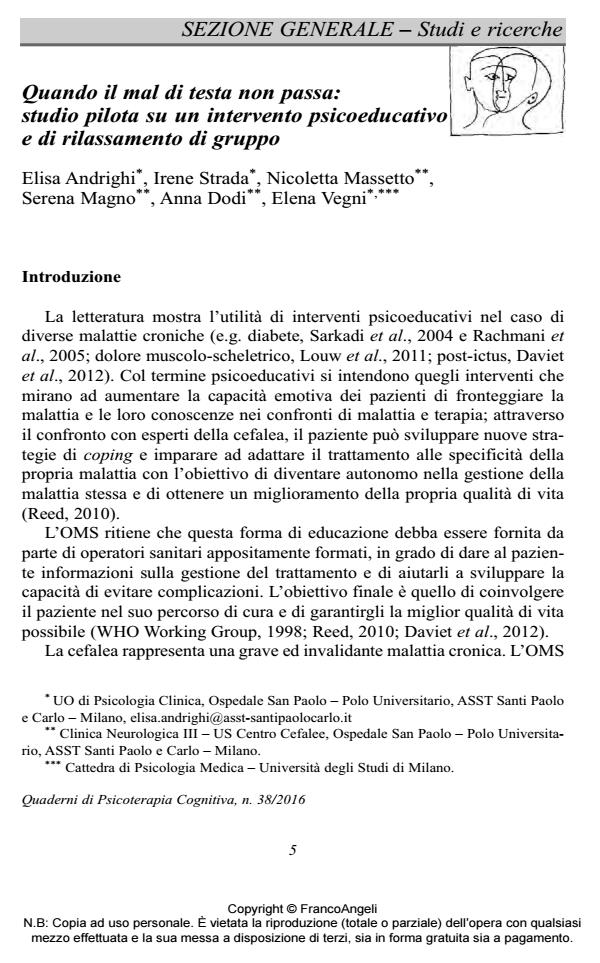When headache won’t go away: pilot study on a group psychoeducational and relaxation intervention
Journal title QUADERNI DI PSICOTERAPIA COGNITIVA
Author/s Elisa Andrighi, Irene Strada, Nicoletta Massetto, Serena Magno, Anna Dodi, Elena Vegni
Publishing Year 2016 Issue 2016/38
Language Italian Pages 11 P. 5-15 File size 114 KB
DOI 10.3280/QPC2016-038001
DOI is like a bar code for intellectual property: to have more infomation
click here
Below, you can see the article first page
If you want to buy this article in PDF format, you can do it, following the instructions to buy download credits

FrancoAngeli is member of Publishers International Linking Association, Inc (PILA), a not-for-profit association which run the CrossRef service enabling links to and from online scholarly content.
Headache is a severe and disabling chronic disease. Several non-pharmacological interventions can reduce frequency and/or intensity of headache attacks and improve life quality. Literature also shows that psycho-educational interventions are useful for several chronic diseases. The Psychology Unit of San Paolo Hospital-University of Milano in collaboration with the Headache Center of the same hospital proposed a psycho-educational and relaxation intervention addressed to patients suffering from headache. The aim is to describe the intervention and report preliminary results. The treatment (eight weekly meetings) is addressed to adults suffering from primary headache. The outcome indicators are a direct measure of headache (headache days per month) and two indirect measures (disability due to headache and medications used). At the end of the intervention patients also filled in a satisfaction questionnaire. 47 subjects participated in the study. The treatment significantly reduced frequency of headache attacks (Wilcoxon p<0,01) and disability caused by headache (Wilcoxon p<0,001). There was also a sensible reduction in medication use. Almost all patients judged the intervention positively. An integrated approach may be very useful to ameliorate the burden of headache, to discontinue medication and to improve quality of life.
Keywords: Psychoeducation, relaxation, headache
- Andrasik F. (2004). Behavioral treatment of migraine: Current status and future directions. Expert Review of Neurotherapeutics, 4(3): 403-413. DOI: 10.1586/14737175.4.3.40
- Andrasik F., Lipchik G.L., McCrocy D.C., Wittrock D.A. (2005). Outcome Measurement in behavioral headache research: headache parameters and psychosocial outcomes. Headache, 45(5): 429-437.
- Andrasik F., Buse D.C., Grazzi L. (2009). Behavioral medicine for migraine and medication overuse headache. Current Pain and Headache Reports, 13(3): 241-248.
- Antonaci F., Dumitrache C., De Cillis I., Allena M. (2010). A review of current European treatment guidelines for migraine. Journal of Headache and Pain, 11: 13-19.
- Daviet J.-C., Bonan I., Caire J.M., Colle F., Damamme L., Froger J., Leblond C., Leger A., Muller., Simon O. (2012). Therapeutic patient education for stroke survivors: Non-pharmacological management. A literature review. Annals of Physical and Rehabilitation Medicine, 55(9): 641-656.
- Galli F., Caputi M., Sances G., Vegni E., Bottiroli S., Nappi G., Tassorelli C. (2016).
- Alexithymia in chronic and episodic migraine: a comparative study. Journal of Mental Health, 6: 1-5. DOI: 10.3109/09638237.2015.112440
- Gerber W.D., Schoenen J. (1998). Biobehavioral correlates in migraine: The role of hypersensitivity and information processing dysfunction. Cephalalgia, 18(2): 5-11. DOI: 10.1177/0333102498018S210
- Grazzi L., Bussone G. (2011). What future for treatment of chronic migraine with medication overuse? Neurological Sciences, 32(1): 19-22.
- Kindelan-Calvo P., Gil-Martinez A., Paris-Alemany A., Pardo-Montero J., Munoz-Garcia D., Angulo-Diaz-Parreno S., Roy La Touche P.T. (2014). Effectiveness of therapeutic patient education for adults with migraine. A systematic review and meta-analysis of randomized controlled trials. Pain Medicine, 15(9): 1619-1636.
- Louw A., Diener I., Butler D.S., Puentedura E.J. (2011). The effect of neuroscience education on pain, disability, anxiety, and stress in chronic musculoskeletal pain. Archives of Physical Medicine and Rehabilitation, 92(12): 2041-2056.
- Rachmani R., Slavacheski I., Berla M., Frommer-Shapira R., Ravid M. (2005). Treatment of high-risk patients with diabetes: motivation and teaching intervention: a randomized, prospective 8-year follow-up study. Journal of the American Society of Nephrology, 16(1): S22-S26. DOI: 10.1681/ASN.200411096
- Reed K. (2010). Therapeutic Patient Education. Sydney, Australia: Royal Prince Alfred Hospital.
- Sarkadi A., Rosenqvist U. (2004). Experience-based group education in Type 2 diabets. A randomised trial. Patient Education and Counseling, 53: 291-298.
- Schramm S.H., Moebus S., Lehmann N., Galli U., Obermann M., Bock E., Yoon M.S.,
- Diener H.C., Katsarava Z. (2015). The association between stress and headache: A longitudinal population-based study. Cephalgia, 35(10): 853-863. DOI: 10.1177/033310241456308
- Stanos S. (2012). Focused review of interdisciplinary pain rehabilitation programs for chronic pain management. Current Pain and Headache Reports, 16(2): 147-152.
- Termine C., Ozge A., Antonaci F., Natriashvili S., Guidetti V., Wober-Bingol C. (2011).
- Overview of diagnosis and management of paediatric headache. Part II: therapeutic management. The Journal of Headache and Pain, 12(1): 25-34.
- Wallasch T.M., Angeli A., Kropp P. (2012). Outcomes of a headache-specific cross-sectional multidisciplinary traetment program. Headache, 52(7): 1094-1105.
- WHO Working Group (1998). Therapeutic Patient Education. Rev. 2. World Health Organization, Regional Office for Europe, Copenhagen -- (testo disponibile al sito: http://www.euro.who.int/__data/assets/pdf_file/0007/145294/E63674.pdf)
Elisa Andrighi, Irene Strada, Nicoletta Massetto, Serena Magno, Anna Dodi, Elena Vegni, Quando il mal di testa non passa: studio pilota su un intervento psicoeducativo e di rilassamento di gruppo in "QUADERNI DI PSICOTERAPIA COGNITIVA" 38/2016, pp 5-15, DOI: 10.3280/QPC2016-038001